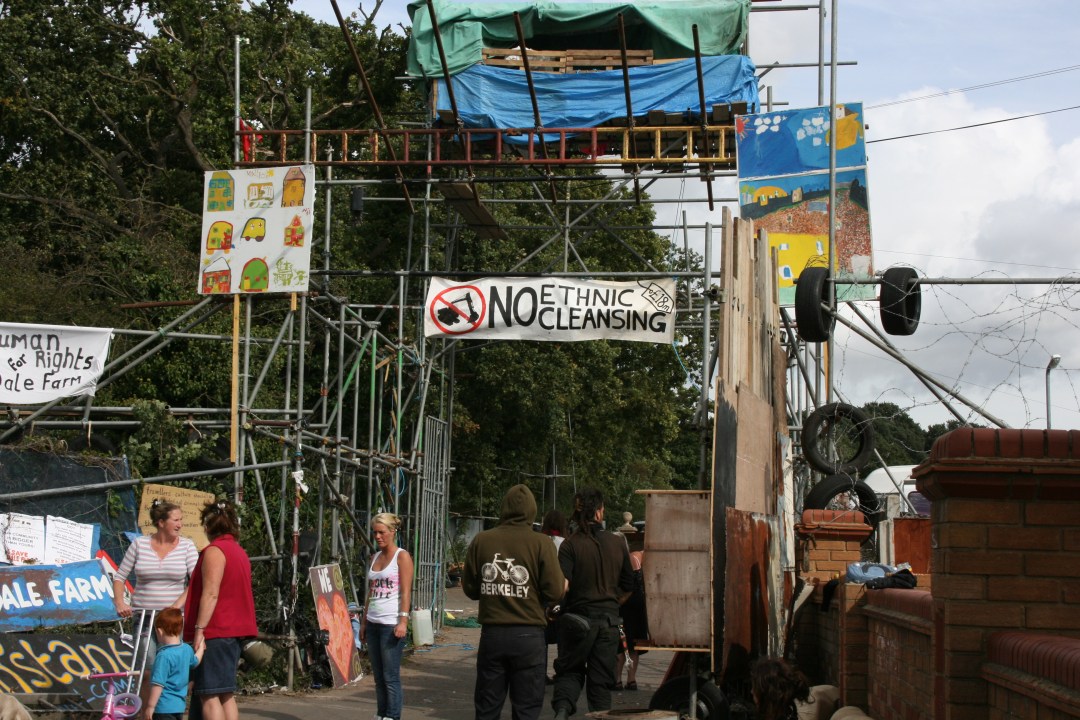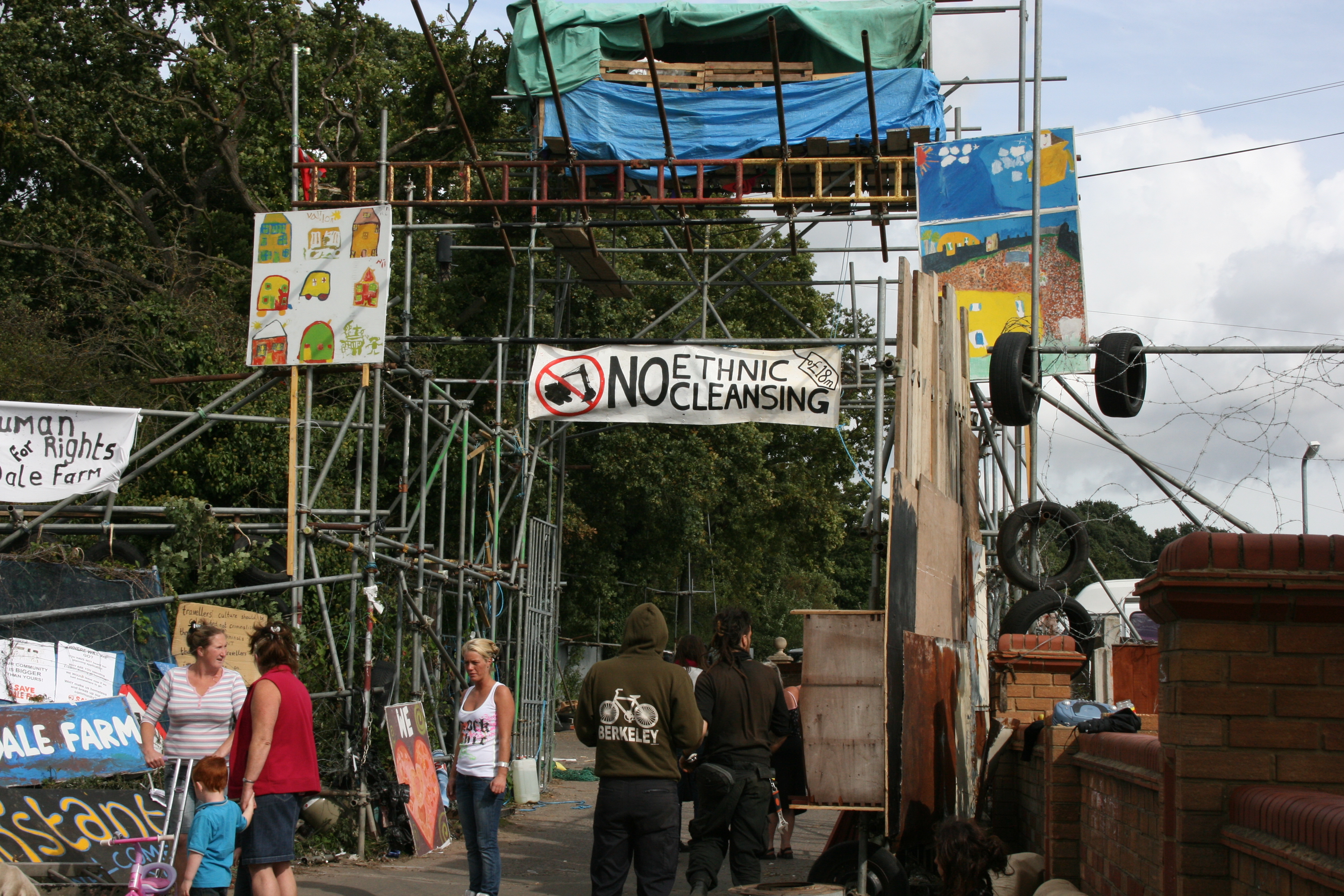
Siobhan Courtney, who blogged for us last week, is part of our ‘another
voice’ series – occasional posts from writing from lines of argument different to the ones we normally take on Coffee House. She has sent this report from Dale Farm, where hundreds of
travellers are due to be evicted tomorrow. Siobhan was granted access to the site, on what will probably be its last day of existence.
Irish folk music pounds out from one chalet. Women vigorously scrub the outsides of neighbouring caravans, while their children bring tea to the men who are fixing their vans. Around them, plastic
statues of Mary Magdalene are firmly rooted into the gravel, draped with crucifixes, shadowed only by clothes billowing on the washing lines.
I’m inside Dale Farm in Basildon, Essex. I have been given access to the UK’s largest and one of Europe’s biggest Traveller sites. Four acres of this secluded field have been home to over 400 Irish travellers for the past decade, but not for much longer. The families that own the plots of land they live on, but developed without planning permission, are awaiting their fate after been served with eviction notices.
The end is nigh after a 10 year row over whether Dale Farm is classified as green belt land that was concreted over by the council or Brownfield land that was also used as a scrap yard.

On Monday, this site will be home no more (if things go to plan). The bailiffs will be sent in and unbelievably – the whole eviction is costing taxpayers a staggering £17.5 million. Documents show Essex Police are coughing up £9.5 million, while Basildon Council (Cons) have had to justify their £8 million expenditure.
“We’ll keep them out, the bailiffs aren’t getting in here,” says defiant 48 year old Kathleen McCarthy. The mother of four was one of the first travellers to pitch up at Dale Farm ten years ago. Her children and now grandchildren go to school in Basildon. She tells me that she’s so depressed she wants to hang herself from the nearest tree. We get onto the subject of politics and she shakes with anger. “Under Labour we had a chance – they understood about the children. But when David Cameron stood up and backed the eviction he made our lives even more of a misery. Isn’t he a two faced git? He stands there and says it’s all about keeping the family together and here he is tearing us all apart and separating us all over”.
I tell her that on my way to Dale Farm I pulled over and spoke to someone who’s lived nearby for thirty years. I quote her what he said: “The travellers aren’t like us – they’re underhand piss takers. They make our lives hell and they’re always pissing up my walls like animals.” Kathleen tells me that no other ethnic minority group is treated as badly as travellers are: “We’re always told to go back to Ireland. We’re told we’re the scum of the earth and we should all be gassed in gas chambers. We were born here though and so were our kids – we’re proud of our Irish history, but we’re English”.
Throughout my time at Dale Farm I hear story after story from the travellers on how they’re abused and treated in the country they live and were born in. Why is it so socially acceptable to refer to them as pikeys, tinkers, gypoes (to name only some of the more mild descriptions I’ve heard in Basildon today)?

The Channel 4 series My Big Fat Gypsy Wedding did them no favours whatsoever, mocking their culture and traditions. Travellers claimed the series fuelled hatred and suspicion of their communities.The series was a ratings winner but History Today warns of the longstanding prejudice against Britain’s Gypsy Travellers.
Moreover, according to the 2006 CRE report on Equality, good race relations and sites for Gypsies and Irish Travellers, relations between Gypsies and Irish Travellers and other members of the public are a particular cause for concern, with people from these groups often leading separate, parallel lives. How can we then relate to a community that we have such poor integration with? The report also found that Gypsies and Irish Travellers have the poorest life chances of any ethnic group today: life expectancy for men and women is ten years lower than the national average.
This is supported by the travellers I’ve met here: a significant proportion of them are confined to their caravans and chalets. Ellen Sheridan, 76 told me she’s at the end. She has cancer of the leg and hand and needs hospital attention for her liver which she described as ‘splitting’. Tears in her eyes she whispers: “I’m too ill to be evicted, I’m too ill, I’m at the end”.
It is clearly evident that many of the travellers at Dale Farm are in poor health. Obesity, lung diseases, diabetes and collective depression are common themes here. One activist who’s moved into the site to support the travellers tells me the conditions are similar to that of socially deprived areas as both communities have little knowledge of health awareness and poor relationships with their PCT’s. She then tells me how a local midwife refused to come out to attend to a post-caesarean woman citing ‘health and safety risks’.
Undeniably, some of the travellers here are too ill to be evicted. I have seen a report from an independent doctor who visited Dale Farm to carry out examinations on the instructions of lawyers. In the report, Dr Frank Arnold concluded, “It is my professional opinion that a significant number of the residents of Dale Farm who are being ordered to leave, would come to serious and predictable medical harm if they are evicted under present arrangements and time scale, and that for some, this harm would be irreversible. In one case it would almost certainly be fatal”.
Despite a widespread hostility from the locals towards the travellers, the story of Dale Farm has received an astonishing amount of international support and recognition. Amnesty International has called the eviction a human rights issue. In addition, a UN adviser visited the site this week and compared the situation to people losing their homes in China, Zimbabwe and Nigeria, claiming the Government is violating international human rights law, In a statement, the Department for Communities and Local Government said: “The British courts have found that the developments at Dale Farm are in breach of planning law and Basildon District Council is within its rights to evict travellers from the site. “It has taken ten years of failed negotiations and legal process to reach this point, and the unprecedented level of unauthorised development on green belt land has severely damaged community relations.”
As the travellers prepare for what Monday will bring, the activist presence at the farm appears to be strengthening. More and more people arrive as the day turns into evening. Aneta Wielgosz, 32 has travelled from Otwocye to support the travellers and says what’s happening in Essex is the same as the expulsion of Roma people in Poland. “This is a form of ethnic cleansing. The culture here has been deliberately cleansed because of the culture that it is and the demonisation of this group would not happen to any other group”.







Comments